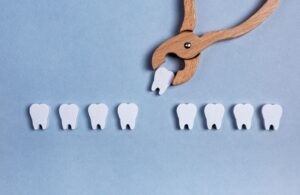
If you have a severely damaged or impacted tooth that’s putting your dental health at risk, your dentist may have no choice but to extract it. However, you might hesitate to move forward with your procedure if you’re concerned that it will be overly agonizing. Many people get nervous about a potential complication known as dry socket, so they procrastinate the treatment that they need to safeguard their smile.
Thankfully, it’s estimated that only 2% to 5% of people will develop this uncomfortable side effect. Continue reading to learn more about it and how you can keep it from occurring!
What is Dry Socket?
After your tooth has been removed, the nerves and tissues underneath it are vulnerable until your mouth forms a blood clot over the extraction site. If this clot is damaged or dislodged, the sensitive materials are exposed to any food particles, germs, and bacteria in your mouth. Not only is this painful, but it can also result in an infection that hinders your ability to heal.
How Can I Prevent Dry Socket?
Your dentist will provide a list of post-op instructions for you to follow to expedite your recovery. Following them in detail is the best way to keep dry socket at bay. To avoid dry socket, they’ll ask that you:
- Don’t drink from straws. The pressure formed by the suction can dislodge the blood clot and lead to aches.
- Drink lots of fluids. This hydrates your body and boosts your immune system, which fights infection and eradicates unwanted particles.
- Avoid strenuous activity. Anything that elevates your heart rate or blood pressure can interfere with the formation of the blood clot. Try to rest as much as possible over the next few days to allow your mouth to heal.
- Gently rinse with salt water. Brushing or flossing could hurt the extraction site, so for the first 24 hours, you might be asked to rinse with salt water instead.
- Watch what you eat. Eating anything overly hot, sugary, spicy, or crunchy could irritate your gums and cause inflammation. Try to stick to soft foods that are easily swallowed, like yogurt, pudding, scrambled eggs, and mashed potatoes.
- Don’t smoke. Dragging on a cigarette or vape can also dislodge your blood clot. On top of that, nicotine reduces blood flow and oxygen levels, which makes it harder for your mouth to get the nutrients it needs to heal properly.
It’s natural to be somewhat sore after your extraction, but if you develop a sharp or persistent pain that doesn’t fade in a few days, contact your dentist. They’ll work with you to address your discomfort and ensure that you recover effectively so you can get back to life as usual!
About the Practice
At Dentex Dental at Bustleton and Red Lion, patients benefit from a team of experts who work together to offer a full range of services under one roof, including tooth extractions. Whether you require basic preventative care or more complex solutions, you’ll receive personalized attention to address your unique dental needs and concerns. They utilize state-of-the-art equipment to enhance your comfort while increasing the accuracy of your treatment results. If you recently had a tooth removed and are worried you’ve developed dry socket, you can contact the office on the website or by calling (215) 677-3904.


 (215) 677-2401
(215) 677-2401